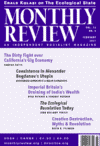
February 2021 (Volume 72, Number 8)
We remember our good friend and comrade, Leo Panitch, one of the great socialist intellectuals of all time, who died on December 19, 2020, age 75. | more…

We remember our good friend and comrade, Leo Panitch, one of the great socialist intellectuals of all time, who died on December 19, 2020, age 75. | more…
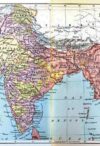
The Western European powers appropriated economic surplus from their colonies, materially and substantially aiding their own industrial transition from the eighteenth century onward, as well as the diffusion of capitalism to the regions of new European settlement. In the case of India, the concept of drain is based on the fact that a substantial part of its earnings was never permitted to accrue to the country; it was instead appropriated by the ruling power: Britain. | more…

Although natural constraints on supply are important, most economic scarcities that rule our lives are actually social and artificial. Supply and demand are not natural forces drifting through the air; they are contrived realities established by an interactive social environment involving governments, corporations, institutions, and classes. Supply and demand cycles are social constructs designed to answer a basic question: Who gets what? | more…

On California’s November 2020 ballot were some contentious and important issues, including Proposition 22, classifying rideshare drivers and app-based delivery workers as independent contractors. Gig economy giants Uber, Lyft, Doordash, and others spent a whopping $111 million on Prop 22. Of course, the companies had a lot to lose. If they were made to treat their drivers or delivery people as employees and compensate them accordingly, they would be bankrupted, they claimed. | more…

Alexander Bogdanov’s Red Star, published in 1908, was an attempt to reenergize the dejected revolutionaries whose efforts had been crushed during the 1905 Russian Revolution. The protagonist, Leonid, is a Russian revolutionary chosen, in the midst of the revolution, by the Martian expedition to visit their planet and learn about the centuries-old advanced form of communism there. Since the triumph of communism in Russia was the cause to which Leonid had decided to devote his life, he agrees to visit Mars so that he can absorb their ideas and principles. | more…

The Ecological Revolution was first published a little more than ten years ago in April 2009, at a time when climate change had already been recognized as a pressing global issue for over two decades, but when there was still hardly any realistic discussion of its connection to capitalism or of the immense ecological and social revolution that would be required to overcome the Earth System crisis. Let us look back to understand the historical gulf separating that time from our own. | more…
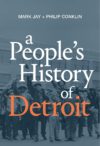
It is a testament to the clarity and scope of Mark Jay and Philip Conklin’s vision that A People’s History of Detroit is replete with insights for those trying to make sense of these deeply uncertain and troubling times. In it, Jay and Conklin show that “in order to give a true ‘people’s history,’ one must do more than condemn the malevolence of those in power and celebrate the activists who have struggled for justice; one must also come to terms with the social system in which these people lived. In our case, this means confronting the logic of capital.” | more…

We are extremely pleased to announce that John Bellamy Foster, editor of Monthly Review, has won the prestigious Deutscher Memorial Prize for 2020 for his The Return of Nature: Socialism and Ecology. | more…

Although the current crisis of production associated with the COVID-19 pandemic has sharpened disparities, the overall problem is much longer and more deep-seated, a manifestation of the inner contradictions of monopoly-finance capital. Comprehending the basic parameters of today’s financialized capitalist system is the key to understanding the contemporary contagion of capital, a corrupting and corrosive cash nexus that is spreading to all corners of the U.S. economy, the globe, and every aspect of human existence. | more…

The Korean War, which broke out on June 25, 1950, can be considered the epicenter of bombing as an instrument of war. For one, it was the first—and, so far, the last—time since 1945 that the United States seriously considered using atomic weapons during the course of an imperial war. It was the first war that the United States did not win. It ended in a stalemate—an armistice—that continues until today. Kinetic fighting was suspended, but the war continues (though only by one side) by what is conveniently but simplistically called sanctions. | more…

A historical-materialist analysis of the relationship between disability, the body, welfare, and capitalism is needed in order to further develop a Marxist understanding of disability. In this framework, we can see how the British welfare state, given recent changes to British disability policy, determines who is able-bodied and who is disabled, with this evaluation made in regard to the needs of monopoly capitalism. | more…
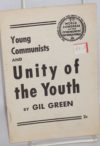
Gil Green was a revolutionary who became J. Edgar Hoover’s “most wanted man in America” until voluntarily surrendering to authorities in February 1956. He lived a life of integrity and courage. | more…
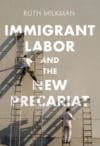
Ruth Milkman’s latest book is a strong scholarly response to the “immigrant threat” narrative that has been central to U.S. politics in the last decades. In Immigrant Labor and the New Precariat, the distinguished labor and migration scholar has a clear goal: to reframe the conversation about migration and increased inequality in the United States, reversing the causal relation that blames migration for the U.S. working class’s current perils. | more…
Notifications